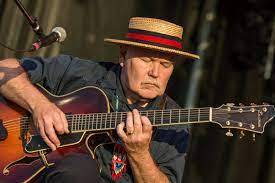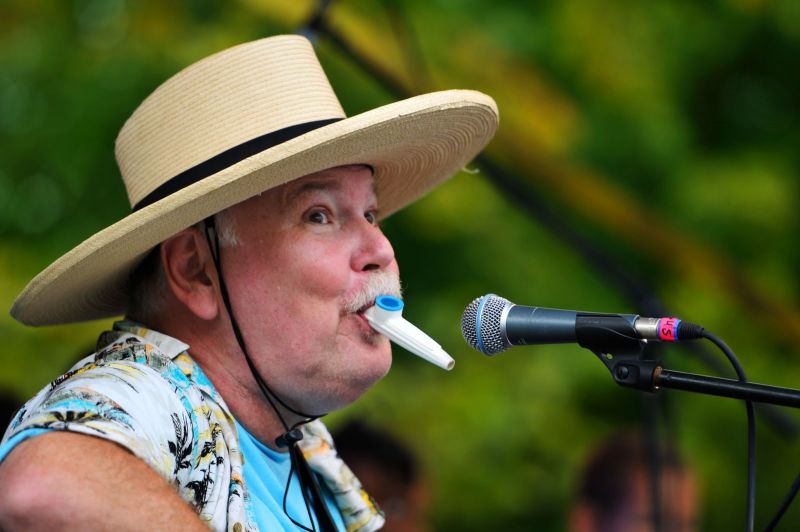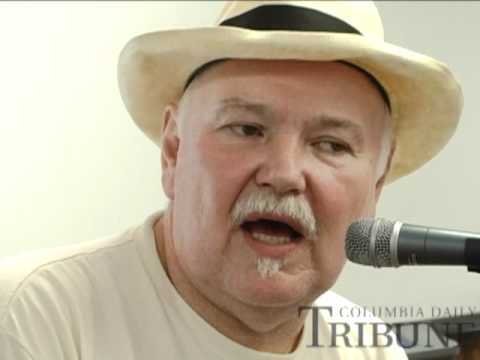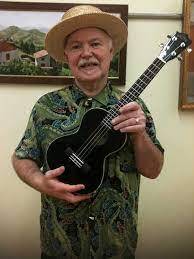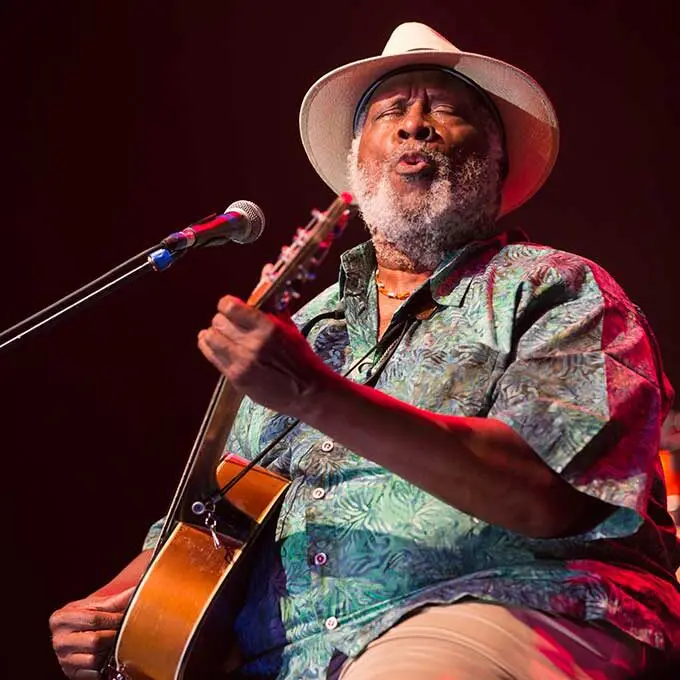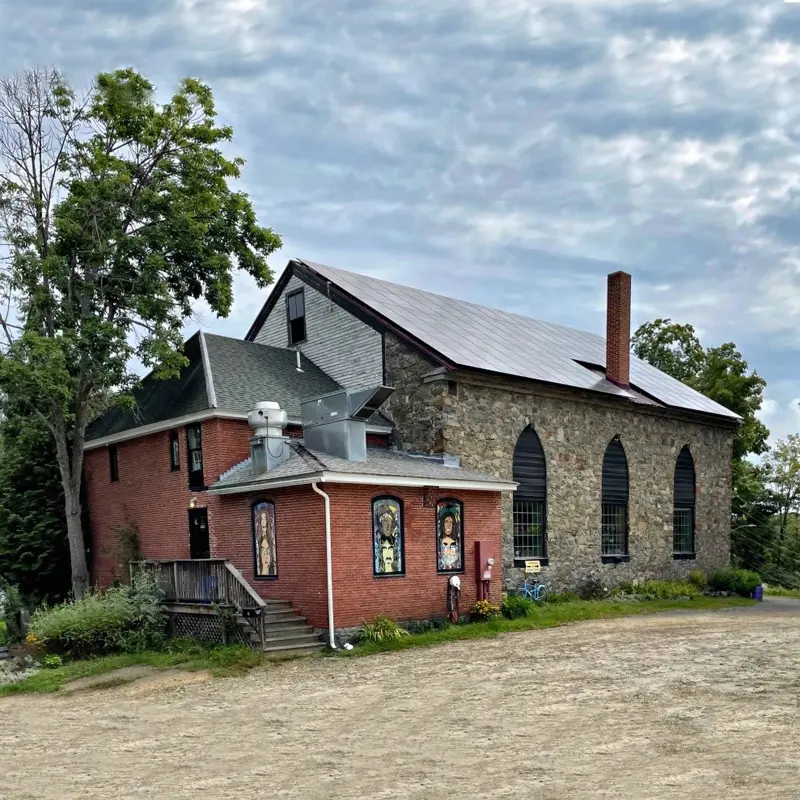TJ Wheeler
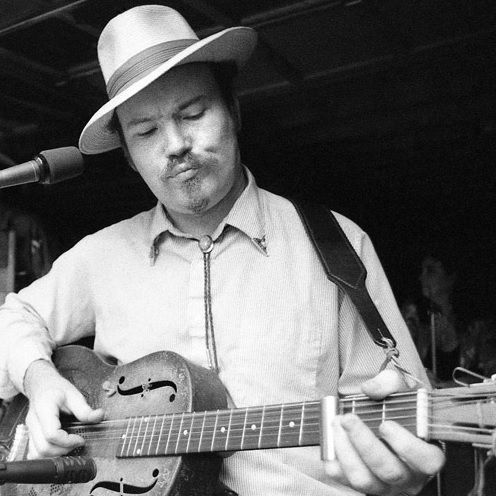
T.J. Wheeler oozes the blues and it shows in a lifetime of commitment to what’s often called “America’s original art form.” He’s an original, yes, but his music is steeped in the timeless traditions of blues and jazz.
Born in Bremerton, Washington in 1952, Wheeler went to see Buddy Guy and Son House as a teenage and instantly became a bona fide blues guy, beginning a lifetime of playing guitar and teaching about the blues. His first teaching gig was in 1971 at a school in Poulsbo, Washington, where the 19-year-old played a concert followed by a workshop about the roots of blues music.
Hitting the road, Booker White, Furry Lewis
The road was and is Wheeler’s musical university, the place where he honed his craft by seeking out blues and jazz greats along the way, not only to learn their styles but to learn about the histories of the two genres. “The blues were originally called ‘the Reals’,” he says, showing that he’s learned more than a little over the decades.
Throughout the ‘70s, Wheeler travelled to blues festivals all over the continent and always made a point to introduce himself to as many of the greats as he could, carrying their guitars, bringing them coffee and doing anything else he could do to endear himself to his heroes. Booker White and Furry Lewis both noticed Wheeler’s passion – not just for their music, but for everything associated with how the music came to be – and became his teachers, asking him to teach to others what they had taught him.
Move to Maine, The Ragtime Millionaires, Teaching
Back home in Washington, Wheeler met a blues harmonica player from Boston named Pat “Hat Rack” Gallagher and they formed a duo, playing in and around Seattle. In the fall of 1974, Gallagher informed Wheeler that he was moving back to New England and asked his new musical partner to come along. After relocating to Maine, they formed The Ragtime Millionaires.
While in Maine, Wheeler rekindled his blues education efforts doing concerts and workshops in local colleges. The Ragtime Millionaires began gigging at New Hampshire venues like The Stone Church and the Kearsarge House and in 1980 Wheeler moved to Portsmouth, where he’s spent most of his time ever since. Wheeler’s move to New Hampshire opened further opportunities to expand his teaching. Although still playing in clubs, in 1988 he was accepted to the Artist in Education program of the New Hampshire Council for the Arts, which led to his teaching throughout the state at the preschool, elementary, junior, middle and high school levels. Among his various workshops were ones that included a culinary aspect; Wheeler had students cook up various meals associated with the blues. Fried catfish, beans and rice, anyone?
For over 40 years, Wheeler’s been a leading proponent of blues, jazz and roots music in general in school programs, not just in New England, but all over the US and other parts of the world. His award-winning Hope, Heroes & the Blues integrated-arts program has reached roughly 500,000 students across five continents and received the prestigious W.C. Handy Keeping the Blues Alive in Education Award in 1993 from the International Blues Foundation “His guitar virtuosity and forceful vocals turned my classroom into an educational juke joint,” said Art Tipaldi, an educator, Blues Revue critic and former board member of the International Blues Foundation.
Blues in the Schools, Blues Bank Collective, Blues Festivals
Wheeler has introduced his Blues in the Schools program to schools in Canada (Ottawa), England, Jackson (Mississippi), Nashville, Brazil, Cuba, Ghana and other school districts in the Americas, Europe and Africa in addition to the Experience Music Project Museum in Seattle. In 1985, along with Valerie Cunningham, he co-founded the Blues Bank Collective, a nonprofit that’s run two annual festivals for 20 years, the Seacoast Black Heritage Festival and the Portsmouth Blues Festival.
From 1986 to 2006, Wheeler was the director of the Portsmouth Blues Festival. Year after year at this family-friendly event, he introduced blues and jazz icons such as Taj Mahal, Koko Taylor, Mose Allison, Marcia Ball, Jimmy Rogers, Pinetop Perkins, Irma Thomas, Leroy Jones, Clarence “Gatemouth” Brown, Zora Young, The Music Makers Foundation Revue and dozens of others at the event.
Collaborations, Other activities, Awards/accolades
Over the decades, Wheeler has worked, studied and performed with a wide variety of notables, among them Mighty Sam McClain, Katie Webster, Nappy Brown, Tiny Grimes, Benny Waters, Honey Boy Edwards and Joe Houston. He’s been featured as a performer and master clinician for such top blues and jazz festivals as the New Orleans Jazz & Heritage Festival, The Harvest Jazz & Blues Festival in Fredericton (New Brunswick), the Ottawa Blues Festival and the Mississippi Valley Blues Festival. It was Wheeler who first proposed that the City of Portsmouth adopt a sister city in Africa (Accra in Ghana) and later he personally delivered greetings from New Hampshire on a his visit. He was a perennially outspoken advocate for the New Hampshire Legislature’s adoption of the Dr. Martin Luther King, Jr. Holiday before it was passed in 2000.
Among the recognition Wheeler has received are a Lifetime Achievement Award from the Jersey Shore Jazz & Blues Foundation in 2008 and he’s been the subject of high praise from several people within the blues and jazz communities. “I don’t believe that anyone has invested the time and dedication to keeping the blues alive that he has,” says Bob Vorel, founder and original publisher of Blues Revue. “He engages young people in an understanding of history through the music,” according to Greg Hodgesen, senior associate priest at Grace Episcopal Church in Charleston South Carolina. “That need for understanding our history in dealing with issues like racism is so important.”
“[T.J. Wheeler is] a tribute to all Black Americans,” says La Gretta Walker, a counselor at Winchester Elementary in Memphis. “He revealed and exemplified consequential knowledge of our cultural heritage…a profound impact on our students. The children were exceptionally proud upon discovering how African Americans have influenced the different types of music. On behalf of all Black Americans, I say thank you.”
Virtually the Blues online program
During Covid pandemic shutdowns, Wheeler transformed his various in-person programs into live, online programs called Virtually the Blues, which were held for audiences from across the US and Canada and as far afield as Nepal, India and Hong Kong. All these years later, he’s still spreading the message that you “sing the blues to lose the blues.” Like the truth, you just can’t keep the blues – or this gifted bluesman – down.
(by Fred Bramante)

